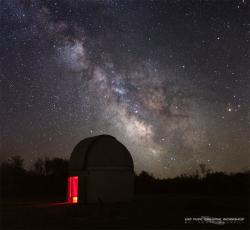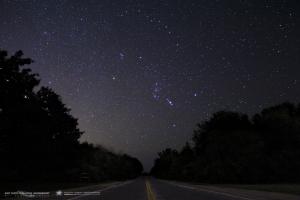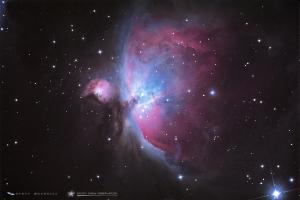
Public Stargazing
- Where:
- Frosty Drew Observatory
- When:
- Friday November 21, 2014 at 6:30 p.m.
- Cost:
- $1 Suggested Donation per Person
Tonight's forecast is calling for crystal clear skies and mid-winter-like temps. As the new Moon approaches, skies will remain super dark all night long. With such awesome stargazing conditions, what could go wrong; right? Well it is going to be cold, and not just late-Autumn cold, but low 20's with wind chills dropping into the teens. Additionally, we could have some strong wind gusts that may restrict viewing to one side of the sky only. Though cold temps and wind make for a tough night, if properly dressed for these conditions, this night can be a fantastic chance to experience the mesmerizing starscape over Frosty Drew Observatory.
We plan to open the Observatory and Sky Theatre at 6:30 p.m. In the Observatory we will be showing off an impressive list of fabulous deep sky objects including the Ring Nebula, The Hercules Cluster, The Orion Nebula, the Andromeda Galaxy, and dozens of deep sky objects not visible under light polluted skies. In the Sky Theatre, the heat will be cranked for those needing a warm-up and an ambient presentation will be displayed on the wall showcasing the fascinating photos we shoot at Frosty Drew. We will stay open until either the Sun, wind or cold chases us out.
At the Observatory we say that sometimes you have to suffer to see the most beautiful nights under the Charlestown starscape. Well tonight is one of those nights and the views will be totally worth every moment of anguish. Make tonight the night that you fall in love with the stars at Frosty Drew Observatory!
-------------------------------------------------------------------------
Weekly Happenings
Scott MacNeill
As the festive Autumn colors start to wind down and the Holiday season reaches full out fluffy-kitten mode, we start to think on the long, cold Winter months ahead of us. Though cold and devoid of late sunsets at the beach, many awesome celestial viewing opportunities arise, including the return of an old Winter friend to our skies, the hunter: Orion.
The constellation Orion is one of the most discernible constellations in the night sky. Plastered into the Winter starscape like a celestial warrior, Orion is the hunter who is infatuated with Merope, one of the Seven Sisters that make up the Pleiades open star cluster, and he is accompanied among the stars with his two hunting dogs, Canis Major and Canis Minor. Though handsome and studly as Orion is, he is only perceived in this form when viewed from our neck of the galactic woods. In reality the constellation Orion is made up of stars that have no celestial relationship with each. Regardless of stellar partnering, the constellation Orion resides toward a fascinating region of the galaxy with many excellent celestial objects illuminating the vast celestial stage.
To start, you have the fabulous Orion Nebula (M42). The nebula is a huge star forming nebula that lies a near 1,500 light years distant and spans 25 light years in diameter. At that distance, M42 ranks as the closest star forming region to planet Earth. Inside the nebula thousands of new born stars are taking shape with infant solar systems just starting their evolutionary journey. Additionally the Orion Nebula is one of the few naked eye visible star forming nebulae and is identifiable as the middle star in Orion's sword. Though awesome in itself, the Orion Nebula is part of a much larger group of nebulae known as the Orion Molecular Cloud Complex (OMCC) which is made up of the Horsehead Nebula, the Flame Nebula, and the huge Barnard's Loop; a possible supernova remnant that forms a half circle around most of the constellation Orion.
At Frosty Drew, the Orion constellation will be a frequent target of mesmerization, and fascination. Celestial viewers often experience the gasps and emotional outbursts resulting from the unexpected level of awesomeness they are presented with when viewing the vast nebula. Visit the Observatory on a chilly Friday night this late Autumn and Winter to experience the beauty of Orion, the celestial hunter.
-Scott


